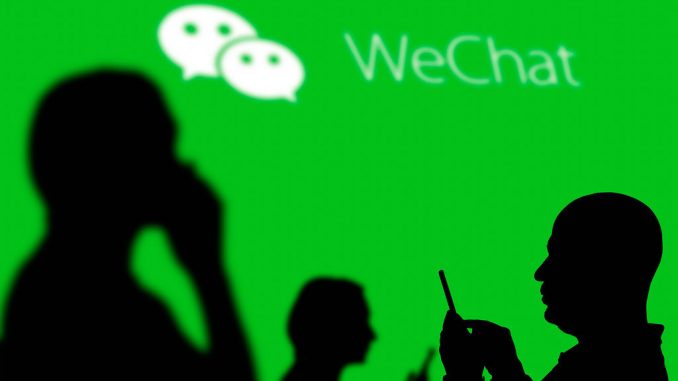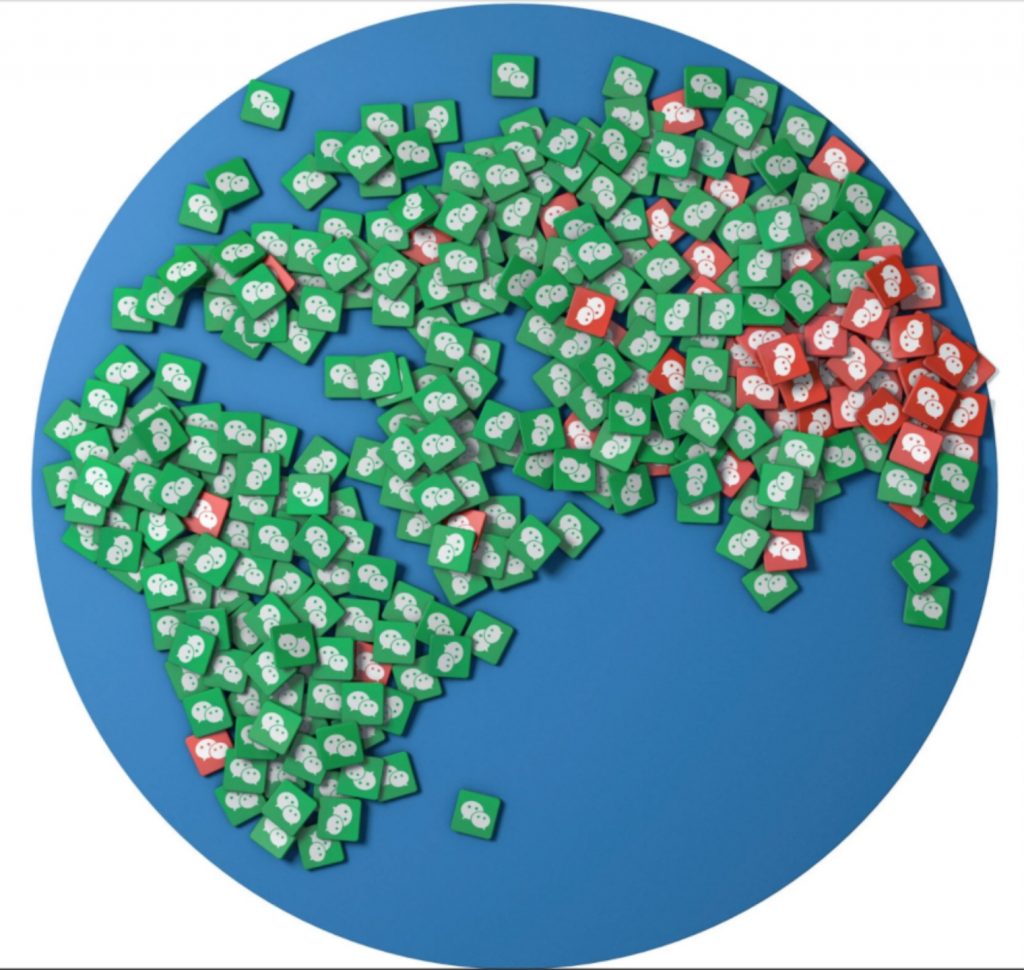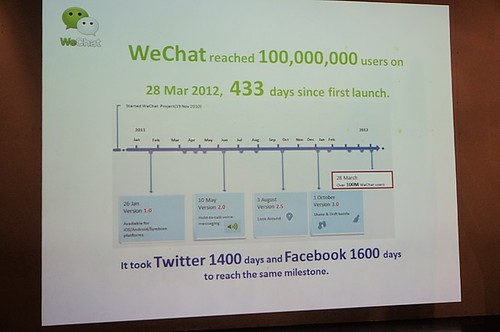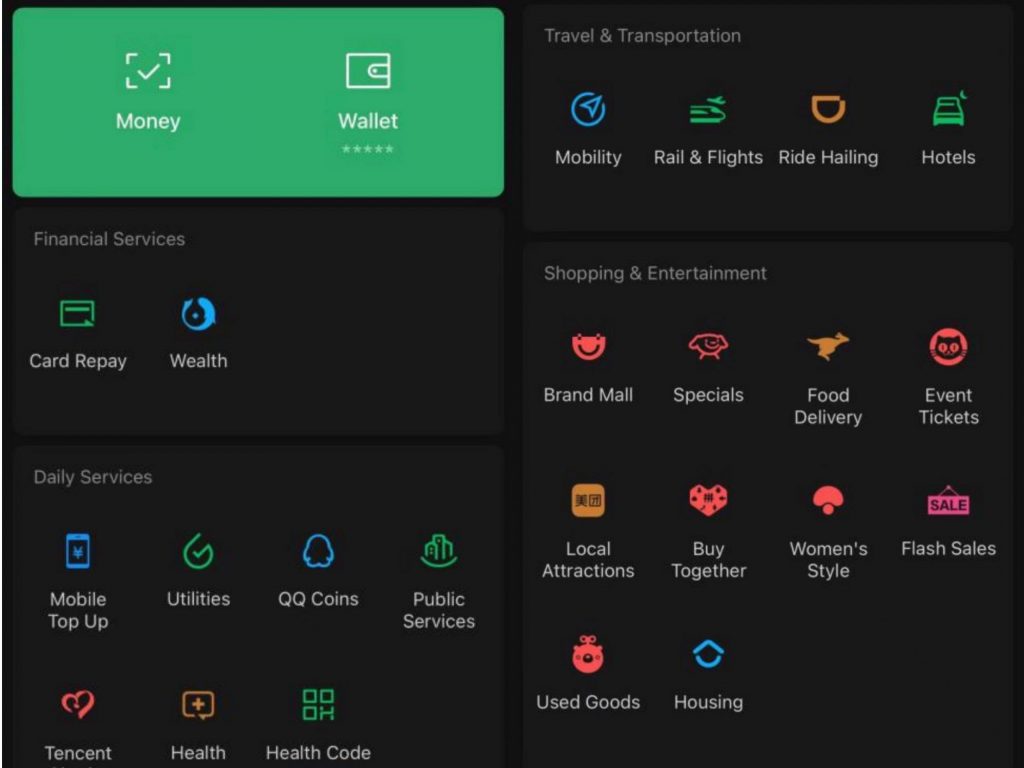

“Forget TikTok. China’s Powerhouse App Is WeChat, and Its Power Is Sweeping.” © 2020 by Paul Mozur is licensed under CC BY-NC-ND 4.0
Before the development and rise of the internet, people used to write letters, faxes, or phone calls to communicate with each other. Over time, and with the advances in internet technology, new products have emerged that can replace the original means of communication. WeChat is one of these new products, providing a convenient and efficient platform to bring people together. This article will be divided into three sections to examine the history and main areas of operation of WeChat, how it can be profitable in running a business, and the concerns that it may have on the development process of the company.
Introduction
WeChat is a social networking application developed and controlled by Tencent, covering a wide range of businesses. WeChat was released and promoted by Guangzhou Research Centre in early 2011 as an instant messaging application known as “Weixin” (Tencent, 2021). At the beginning of its development WeChat only served as a platform for users to communicate. It differed from other messaging applications only in its voice calling and voice messaging features.
 “wechat” by Sinchen.Lin is licensed under CC BY 2.0
“wechat” by Sinchen.Lin is licensed under CC BY 2.0
By 2012, it had over 100 million registered users (Boyd, 2017). It has since developed several supplementary ways to provide users with quality and convenience. The ‘Friends’ feature, for example, was a milestone in WeChat’s development. People began to communicate and share their lives through pictures and short videos, using the circle of friends to keep up with the latest news from friends and family. To date, WeChat has a large and active user base, with 10.9 billion users opening WeChat every day, 330 million making video calls, 780 million accessing Friends, and 120 million posting to Friends. Users can share text, photos, and short videos in their circle of friends, use the WeChat platform for content such as games, public welfare or traffic, and travel, and read articles published by public websites.
By now, WeChat has become a vital part of the Chinese people’s social life, combining communication, app shop, and search functions. The combination of these features makes it like a combination of Facebook, WhatsApp, and Google (Boyd, 2017). WeChat has made a wonderful transition from a general messaging platform to a social networking app used by almost everyone in China.
Profitability and sources of income

ALL WECHAT FEATURES IN 2020 © 2020 by Juan is licensed under CC BY-NC-ND 4.0
WeChat is a multi-faceted social platform that offers much more than simple communication. In addition to its platform services, WeChat also has close capital sharing and cooperation with several companies under Tencent’s name or in partnership with Tencent. The following are a few notable examples.
Takeaway functions and business
Meituan Takeaway, the most influential takeaway company in China, has its platform and app, which allows people to get the food or stuff they need, when they need it, in the fastest and most convenient way. Meituan Takeaway has a dedicated app on the WeChat platform and users can even find the Meituan Takeaway app in the WeChat interface to order food and place orders without downloading the Meituan Takeaway app. WeChat provides a platform to access the internet, and Meituan takeaway and such businesses can use the app to reach out to the public more.
Urban businesses such as transportation and bill payment
The fact that several transports and energy companies have already partnered with Tencent and WeChat makes WeChat even more of an infrastructure platform. The infrastructure platform can connect data flows and integrate information, making it easier for these urban service companies to share resources ( Van Dijck, Poell, & de Waal, 2018). For example, Ctrip has a mini-application on WeChat that provides users with an at-a-glance view of how to get around and recommendations for accommodation they might need. Another app, such as Mobike, quickly receives information about a user’s location and provides a quality and convenient bike rental service.

“Mobike app” by sinosplice is licensed under CC BY-NC 2.0
People can also pay for their electricity and water bills through the WeChat app. WeChat thus establishes a link between social production and people’s lives, providing convenience for users and leading to opportunities for business partnerships with WeChat.
Medical consultation
Users can meet their requirements through the medical and health aspects of WeChat’s business. Users can make one-to-one online consultations with a doctor through WeChat and get an initial diagnosis and advice from the doctor by simply explaining their symptoms and concerns. Users can also book appointments via WeChat. It also provides daily first aid, a brief introduction to various common diseases, and a medication inquiry service.
WeChat’s profitability is very clear, as it has a smooth and effective closed loop of capital traffic. WeChat’s large audience attracts companies in the industry to work with Tencent or WeChat, and Tencent identifies and invests in the winners from the vast amount of data to maximize the benefits and provide the highest quality service. After initial success, Tencent uses its analysis of the data to drive more traffic to the invested companies, thereby gaining more users. Tencent then invests more money to consolidate the investor’s position and achieve traffic growth and capital appreciation. This is a circle in which Tencent and WeChat are promoted and used more widely, attracting more companies in the industry that want to work together. This is the key code for WeChat’s rapid growth and profitability and success.
Concerns
So is the increasing proportion of resources and traffic taken up by WeChat entirely beneficial to both the public and society?
Monopoly and unfair competition
Large technology companies like WeChat have a monopoly in their industry. According to research, eight of the top ten companies in the world are now internet technology companies. Their competitors are either sidelined or excluded from the market. Is this unfair competition and development likely to endanger the whole economy and society or the lives of the people? WeChat is one of the major technology companies that is being considered in this context. When using WeChat, users also feel that they can use it for all their different needs and daily business needs. The side effect of this is that WeChat has a monopoly in the lives of the public as well as businesses in the same industry. Will WeChat use its strong position in the market to set rules to crowd out its competitors?
Facebook’s system was down for six hours, and all of its subsidiaries, including Instagram and Messenger, were unavailable for six hours. This caused dissatisfaction and inconvenience to users, as well as losses to advertisers who had invested in Facebook and businesses that needed to do business on Facebook. This reflects the fact that technology companies need more competition and more choice. If our lives or businesses are dependent on just a few large companies for advertising, then when such large companies fail, it has an impact on our lives.
Invasion of user privacy
A popular saying in academia: “Data is the new oil of the 21st century.”
Oil was a huge untapped and valuable asset in the 18th century. So what this means is that in the 21st-century data is like the oil of the 18th century. For example, when we use WeChat we may reveal our birth and current area of life, our gender, and our age. Every message we share and which types of public posts we click on more often are some of the more raw data. When raw data on many individuals is collected completely and accurately, and possibly linked to other relevant data, this data can be of great value. They use this data to increase money, attention, and user engagement (Flew, 2021). So can this be seen as a violation of users’ privacy? In collecting and analyzing data, platforms such as WeChat may also be linked to advertisers who may pay to place advertisements on WeChat, which will then analyze the types of messages users have recently viewed or sent to determine what they are likely to be interested in and deliver relevant advertisements to specific users. More importantly, when targeting specific groups of users, targeted advertising inevitably excludes other groups of users. Are the excluded user groups likely to be discriminatory and biased based on gender, race, sexual orientation, presence or absence of disability, income and education levels, and religious beliefs? It is symptomatic of systemic oppression (Noble, 2018).
In short, if WeChat, the Chinese internet giant, wants to continue to expand its business empire, it must pay closer attention to the needs of its users, protect their privacy and security as much as possible and adapt its internal competition to reduce the dangers of a monopolistic industry. Only then will WeChat be able to bring further benefits to society and the public.
References:
Tencent. Tencent.com. (2021). Retrieved 17 October 2021, from https://www.tencent.com/zh-cn.
Boyd, c. (2017). WeChat: The evolution and future of China’s most popular app. medium. Retrieved 15 October 2021, from https://medium.com/swlh/wechat-the-evolution-and-future-of-chinas-most-popular-app-11effa5639ed.
Van Dijck, J., Poell, T. & de Waal, M. (2018). The Platform Society. Oxford: Oxford University Press, pp. 5-32 (‘The Platform Society as a Contested Concept’).
Noble, S. (2018). Algorithms of Oppression: How Search Engines Reinforce Racism, New York, USA: New York University Press.
Flew, T. (2021). ARIN2610:Internet Transformations,Lecture5, week5, module Week 5-Digital Platforms and the Sharing Economy[PowerPoint slides]. University of Sydney Canvas. https://canvas.sydney.edu.au/courses/34089/pages/week-5-digital-platforms-and-the-sharing-economy?module_item_id=1160573

This work is licensed under a Creative Commons Attribution-NonCommercial 4.0 International License.